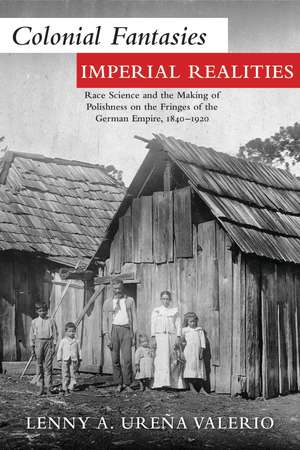Colonial Fantasies, Imperial Realities: Race Science and the Making of Polishness on the Fringes of the German Empire, 1840–1920: Polish and Polish American Studies
Autor Lenny A. Ureña Valerioen Limba Engleză Paperback – 14 feb 2021
In Colonial Fantasies, Imperial Realities, Lenny Ureña Valerio offers a transnational approach to Polish-German relations and nineteenth-century colonial subjectivities. She investigates key cultural dynamics in the history of medicine, colonialism, and migration that bring Germany and Prussian Poland closer to the colonial and postcolonial worlds in Africa and Latin America. She also analyzes how Poles in the German Empire positioned themselves in relation to Germans and native populations in overseas colonies. She thus recasts Polish perspectives and experiences, allowing new insights into identity formation and nationalist movements within the German Empire.
Crucially, Ureña Valerio also studies the medical projects and scientific ideas that traveled from colonies to the German metropole, and vice versa, which were influential not only in the racialization of Slavic populations, but also in bringing scientific conceptions of race to the everydayness of the German Empire. As a whole, Colonial Fantasies, Imperial Realities illuminates nested imperial and colonial relations using sources that range from medical texts and state documents to travel literature and fiction. By studying these scientific and political debates, Ureña Valerio uncovers novel ways to connect medicine, migration, and colonialism and provides an invigorating model for the analysis of Polish history from a global perspective.
Crucially, Ureña Valerio also studies the medical projects and scientific ideas that traveled from colonies to the German metropole, and vice versa, which were influential not only in the racialization of Slavic populations, but also in bringing scientific conceptions of race to the everydayness of the German Empire. As a whole, Colonial Fantasies, Imperial Realities illuminates nested imperial and colonial relations using sources that range from medical texts and state documents to travel literature and fiction. By studying these scientific and political debates, Ureña Valerio uncovers novel ways to connect medicine, migration, and colonialism and provides an invigorating model for the analysis of Polish history from a global perspective.
Preț: 230.88 lei
Nou
Puncte Express: 346
Preț estimativ în valută:
44.18€ • 46.25$ • 36.56£
44.18€ • 46.25$ • 36.56£
Carte disponibilă
Livrare economică 17-31 martie
Livrare express 28 februarie-06 martie pentru 27.64 lei
Preluare comenzi: 021 569.72.76
Specificații
ISBN-13: 9780821424537
ISBN-10: 082142453X
Pagini: 320
Ilustrații: 8
Dimensiuni: 152 x 229 x 23 mm
Greutate: 0.4 kg
Editura: Ohio University Press
Colecția Ohio University Press
Seria Polish and Polish American Studies
ISBN-10: 082142453X
Pagini: 320
Ilustrații: 8
Dimensiuni: 152 x 229 x 23 mm
Greutate: 0.4 kg
Editura: Ohio University Press
Colecția Ohio University Press
Seria Polish and Polish American Studies
Recenzii
“Stands to revolutionize how scholars conceive of imperial Germany’s eastern domains as well as German-Polish and German-Slavic relations. Of great interest to an interdisciplinary audience that includes specialists of Central Europe, Germany, Poland, migration, imperialism, race, the history of medicine, and African and Latin American studies. Ureña Valerio’s approach and findings are remarkably original and important, and offer an excellent example of how Central European history, and even Polish history, can be written in a global approach and in the context of European colonialism.”—Peter Polak-Springer, author of Recovered Territory: A German-Polish Conflict over Land and Culture, 1919–1989
“Ureña Valerio’s innovative work addresses what has been missing in recent works on the ‘eastern turn’ and ‘colonial turn’ in German studies: it integrates Polish responses to German colonial projects, both discursive and real. Another valuable contribution is her analysis of eugenics and racial hygiene discourses.”—Larry Wolff, author of Inventing Eastern Europe
“This highly interesting work brings together the insights of colonial and comparative studies. Ureña Valerio applies them to the Polish-German borderland, or ‘Prussian Poland,’ the subject of which has until now been dominated by traditional monographs seeking to claim the land as either rightfully German or rightfully Polish. Her approach is new and refreshing.”—Markus Krzoska, University of Siegen
“(Colonial Fantasies, Imperial Realities) is not only an exceptional addition to the discussion around identity formation and the making of Polishness, but also offers new insights on colonial comparative studies, and an invaluable addition to theories of eugenics and race science in Europe.”—History: The Journal of the Historical Association
Notă biografică
Lenny A. Ureña Valerio is the associate director for program development at the Latin American and Iberian Institute at the University of New Mexico. Her primary research and teaching interests include imperial/colonial studies, European migration to Latin America, Polish diaspora in Brazil, the history of medicine and public health, and historical methods and theories.
Descriere
Ureña Valerio illuminates nested imperial and colonial relations using sources ranging from medical texts and state documents to travel literature and fiction. She analyzes scientific and medical debates to connect medicine, migration, and colonialism, providing an invigorating model for the analysis of Polish history from a global perspective.












